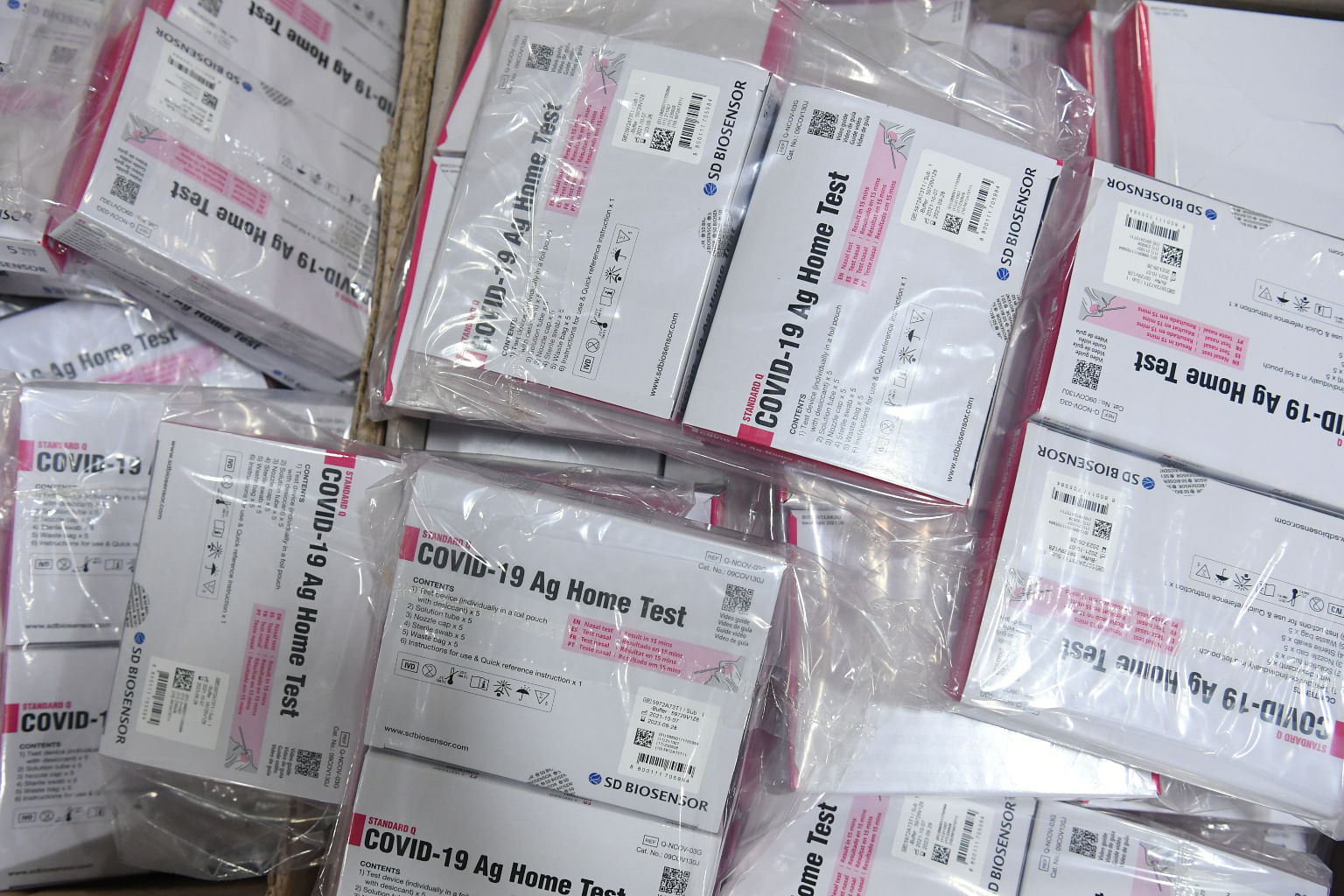Commentary
More clarity and consistency on Covid-19 self-test kits needed
Sign up now: Get ST's newsletters delivered to your inbox

The authorities are also making it difficult for local manufacturers to get approval for ART kits made here to be sold here.
ST PHOTO: JASON QUAH
Follow topic:
SINGAPORE - The protocols on Covid-19 self-test kits by the Health Sciences Authority (HSA) puzzle me.
Since Dec 23, the HSA has allowed local and foreign travellers entering Singapore to bring up to 20 antigen rapid test (ART) kits that may not have been authorised for use here, as long as they are approved for use by a regulator in another country.
The reason given is that it might be difficult for them to get the kits after they arrive, and they would need them almost immediately for their required daily tests.
The HSA said it decided on 20 kits a person as "this number is based on the requirement for incoming travellers to self-test daily over the course of 14 days, with allowance for retesting".
All well and good, although I do not see why ART kit dispensing machines that accept credit cards can't be placed at the airport to facilitate purchase by incoming passengers. Similarly, kits could be sold at the Causeway for people allowed to enter under the land Vaccinated Travel Lane (VTL) scheme with Malaysia.
What confounds me is the HSA's decision to ban the import of kits approved by other regulators, other than the 11 kits it has approved for use in Singapore.
Of kits outside its list of 11, HSA said: "As some of these test kits, which have not been evaluated for quality and efficacy, may be resold locally, HSA had disallowed their imports to safeguard public health."
It also warned that "any onward supply by wholesale of self-test kits is also not permitted and will require licences and authorisation from HSA. Those infringing this can be imprisoned for up to two years and/or fined of up to $50,000, if convicted".
On top of that, the authorities are making it difficult for local manufacturers to get approval for ART kits made here to be sold here.
Kits require either prior approval by a recognised authority like the Food and Drug Administration of the United States, or publication in an international journal on their efficacy, before getting an invitation from the Ministry of Health to submit them to HSA for approval.
Such stringent requirements are normally needed only for equipment considered of higher risk, usually because they are intrusive - such as heart valves or implantable defibrillators - so greater care is needed for their approval.
That these regulations apply to ART kits reflects the importance of Covid-19 test results, hence high safety and efficacy levels are required.

On their own, such stringent regulations make sense. They are to protect people and to ensure that the coronavirus test results are accurate to a high degree.
But it is puzzling when the HSA then decides to allow in hundreds of thousands of non-HSA-approved kits daily to be used here on a par with kits that have undergone stringent testing before being approved for sale.
There is also the matter of price.
In Malaysia, ART kits are selling for between RM3.90 (S$1.26) and RM4.80 a kit. The cheapest kits allowed to be sold in Singapore cost about $5 each.
The sale of tickets under the VTL scheme was suspended for about a month from Dec 23. But those who had bought tickets earlier have been allowed in.
This means up to 4,320 people are allowed to enter through the Causeway daily with a maximum 20 kits each. That's a whopping 86,400 kits each day.
Air travellers, too, can bring in their own kits. Up to 15,000 people are allowed to fly in daily under the VTL scheme, bringing in possibly another 300,000 non-HSA-approved ART kits each day.
Then there are the other air passengers not under the VTL scheme. They, too, can bring in 20 self-test kits each.
With the authorised use of so many non-HSA-approved kits here, do the current strict controls over the sale and import of these kits make sense?
Meanwhile, ART kits made in Singapore, which can't be sold here but are currently sold overseas, may be brought in by people coming here, for use in Singapore. Am I the only one confused?
There needs to be clarity and consistency.
The HSA should allow people entering the country to bring in only ART kits that have been approved for use in Singapore.
These kits should also be sold at the point where visitors do their mandatory entry test.
Alternatively, it should relax its rules to allow ART kits approved by other regulators to be imported and sold here.
Testing of visitors is no less important than testing residents. On Dec 30, there were 193 new Covid-19 new cases in the community and 114 that were imported. Among them were 103 Omicron cases - 33 in the community and 70 imported.
There is no reason for different standards, and allowing expediency to overrule the need for safety and efficacy can't be a good thing.
More importantly, what if the kits used by travellers aren't reliable and result in the virus spreading in the community? This would negate Singapore's efforts to slow down the spread of the highly transmissible Omicron variant.
All it would take is a handful of undetected cases for it to rage through the country, the way it has done in South Africa, the United States and Europe.

